Suchergebnisse
QB3R - QS-gefertigte Hochleistungsbauteile auf Basis 100% biobasierter Rohstoffe mit hohem Reparatur- und Recyclingpotential
Das Vorhaben QB3R zielt darauf ab ein Epoxidharzsystem mit einem biobasierten Kohlenstoffanteil von 100% zu entwickeln. Das QB3R-Harz wird sich mit einer breiten Palette an Verarbeitungstechniken qualitätsgesichert zu Hochleistungsbauteilen für langlebige Sachgüter verarbeiten lassen.
IEA PVPS Task 1: Trends Report 2021 in Photovoltaic Applications

Der IEA PVPS Trends Report gibt einen Überblick über die aktuellen Entwicklungen bei Markt, Produktion und Rahmenbedingungen von Photovoltaik.
Herausgeber: IEA PVPS, Task 1 2021
Englisch, 80 Seiten
IEA PVPS Task 1: Trends 2016: Trends in Photovoltaic applications - Survey Report of Selected IEA Countries between 1992 and 2015

Überblick über die aktuellen Entwicklungen bei Markt, Produktion und Rahmenbedingungen in den IEA PVSP Mitgliedsländern.
Herausgeber: IEA PVPS Task 1
Englisch, 72 Seiten
Downloads zur Publikation
IEA SHC Task 48: Contracting Models for Solar Thermally Driven Cooling and Heating Systems (2014)

Diese Publikation beschreibt die Vor- und Nachteile des Contracting bei solarthermischen Kühlungen sowie wichtige Aspekte zur Etablierung eines Contracting-Modells.
Moritz Schubert, Sabine Putz
Herausgeber: IEA SHC Task 48
Englisch, 34 Seiten
Downloads zur Publikation
IEA SHC Task 48: Qualitätssicherung und Unterstützungsmaßnahmen für solare Kühlsysteme
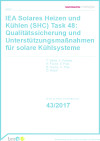
Der IEA SHC Task 48 fokussierte auf die Qualitätsverbesserung und marktunterstützende Maßnahmen zur Technologieoption "Solarthermisches Kühlen bzw. Klimatisieren". In Kooperation mit insgesamt 22 Organisationen (12 Forschungsinstitute, 5 Universitäten und 5 Unternehmen) aus acht Ländern wurden unter signifikanter österreichischer Beteiligung zahlreiche Ergebnisberichte geliefert und Werkzeuge zur Qualitätsverbesserung von solaren Kühlanlagen entwickelt.
Schriftenreihe
43/2017
T. Selke, A. Preisler, H. Focke, S. Putz, B. Nocke, A. Thür, D. Neyer
Herausgeber: BMVIT
Deutsch, 44 Seiten
Downloads zur Publikation
Wissenschaft, Start-ups und Unternehmen: In der Zusammenarbeit liegt das Geheimnis des Erfolgs
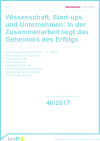
Eine Bestandsaufnahme der Innovations- und Start-up-Aktivitäten in der österreichischen Energiebranche mit Handlungsempfehlungen für Stakeholder und politische Entscheidungsträger
Schriftenreihe
46/2017
H. Bieser
Herausgeber: BMVIT
Deutsch, 55 Seiten
Downloads zur Publikation
Internationales Großwärmepumpenforum 2018
16. - 17. Mai 2018
Museumsquartier Wien, Museumsplatz 1, 1070 Wien bzw. Rathaus der Stadt Wien, Friedrich-Schmidt-Platz 1, 1010 Wien
Das mitteleuropäische Großwärmepumpenforum 2018 in Wien bringt erfahrene Anwender, potentielle neue Kunden und Anbieter von verschiedenen Wärmepumpenlösungen zusammen.
Studie "Potenziale der Digitalisierung im Bauwesen"
Am 18. April 2018 wurde die Studie zu den Potenzialen und Herausforderungen der österreichischen Baubranche durch die zunehmende Digitalisierung vorgestellt. Die Studie beinhaltet eine Ableitung von Handlungsfeldern für zukünftige Forschung aus Sicht von Wissenschaft und Praxis. Vor dem Hintergrund der fortschreitenden Digitalisierung wurden außerdem Maßnahmen und ein strategischer Zeitplan für die schrittweise Umsetzung von Digitalisierungs- und Vernetzungsprozessen in allen Phasen von Bauprojekten entwickelt.
Gemeinsame Ausschreibung der Joint Programming Platform Smart Energy Systems (JPP SES) und dem GEOTHERMICA ERA-Net zur Förderung der Heiz- und Kühltransition
Die Joint Programming Platform Smart Energy Systems (JPP SES) hat in Zusammenarbeit mit dem GEOTHERMICA ERA-Net eine gemeinsame Ausschreibung für transnationale Projekte zum 31. Mai 2021 gestartet. Konsortien sind eingeladen ihre Projektkonzepte bis zum 4. Oktober 2021 (17:00 MESZ) einzureichen.
Syn[EN]ergy - Synergiepotenziale zwischen Stadtplanungszielen und Photovoltaiknutzung auf Freiflächen
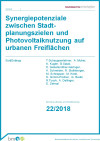
Im Rahmen von Syn[En]ergy wurden Synergien und Konfliktpotenziale der PV gegenüber anderen Nutzungen untersucht, planerische Lösungsvorschläge für konkrete Freiflächen unter Berücksichtigung ökonomischer, stadtplanerischer, gestalterischer, rechtlicher und sozialer Aspekte entwickelt und die Ergebnisse gemeinsam mit Stakeholdern aus Wirtschaft, Verwaltung und Gesellschaft bewertet.
Schriftenreihe
22/2018
T.Schauppenlehner, A. Muhar, K. Kugler, B.Salak, E. Gebetsroither-Geringer, A. Schneider, R. Stollnberger, M. Schnepper, M. Köstl, D. Grimm-Pretner, G. Bautz, R.Tusch, A. Dallinger, E. Sehnal
Herausgeber: BMVIT
Deutsch, 43 Seiten
Downloads zur Publikation
Nachhaltige Wohnformen und smarte Gebäude
6. November 2018, 14:45 - 18:00 Uhr
Haus der Begegnung, Rennweg 12, 6020 Innsbruck
Der Cluster Wellness Tirol widmet sich dem Zukunftsthema gesundes Wohnen im Themenschwerpunkt Wellness at Home. Sogenannte "Wellness Communities" bis hin zu "SMART Homes" sind im Entstehen und sollen auch in Tirol bei Projekten aufgegriffen werden.
Technologie-Roadmap Photovoltaik (Teil 2, 2018)
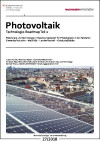
Potenziale und Technologie-Entwicklungsbedarf für Photovoltaik in den Sektoren Gewerbe/Industrie – Mobilität – Landwirtschaft – Gebäude/Städte
Schriftenreihe
27/2018
Hubert Fechner, Maximilian Rosner, Christoph Mayr, Marcus Rennhofer, Astrid Schneider, Gerhard Peharz
Herausgeber: BMVIT
Deutsch, 83 Seiten
Downloads zur Publikation
IEA PVPS Task 1 Trends 2018: Trends in Photovoltaic applications - Survey Report of Selected IEA Countries between 1992 and 2017

Der IEA PVPS Trends Report gibt einen globalen Überblick über Photovoltaik-Technologieentwicklungen, den globalen Markt sowie die politischen Rahmenbedingungen weltweit. Ebenso wird die wachsende Rolle bzw. die Wettbewerbsfähigkeit der Photovoltaik in der Energiewirtschaft beschrieben.
Mehrsprachig
Downloads zur Publikation
IEA 4E Annex: Elektrische Motorsysteme. Arbeitsperiode 2014 - 2017
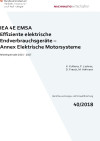
Im Rahmen des Annex Electric Motor Systems soll Bewusstseinsbildung über das große Energieeinsparpotenzial von Motorsystemen und das Aufzeigen von Wegen zur Realisierung dieser Potenziale erfolgen. Aktuell umfasste die Österreichische Beteiligung insbesondere die Task Leitung Energy Audits for Motor Systems zur Erarbeitung von Empfehlungen zur Durchführung von normkonformen Energieaudits in Motorsystemen.
Schriftenreihe
40/2018
K. Kulterer, P. Lackner, D. Presch, M. Hofmann
Herausgeber: BMVIT
Deutsch, 50 Seiten
Downloads zur Publikation
Science Brunch "Urbane Wärmewende"
11. März 2019, 09:30 - 14:30 Uhr
The Stage in der Donau-City-Straße 1, 1220 Wien
Insgesamt sechs Spannende und zukunftsweisende Forschungsprojekte aus den Programmen des Klima- und Energiefonds und dem BMVIT zeigen auf, wie die urbane Wärmewende gelingen kann. Damit leisten der Klima- und Energiefonds und das BMVIT einen wichtigen Beitrag zur Erreichung der internationalen Klimaziele mit Innovationen aus Österreich.
IEA HPT Annex 42: Final Report

Der Endbericht des IEA HPT Annex 42 gibt einen Überblick über die Einbindung von intelligenten Wärmepumpen in Smart Grids.
Herausgeber: BHD, IEA HPT Annex 42
Englisch, 239 Seiten
Downloads zur Publikation
Produktion der Zukunft – 32. Ausschreibung
Im Rahmen der FTI-Initiative "Produktion der Zukunft" werden 2019 rund 20 Millionen Euro für themenspezifische Fördermaßnahmen im Programm bereitgestellt. Ausschreibungsschwerpunkte: Industrie 4.0, Additive Fertigung, Werkstoffe, Robotik und Künstliche Intelligenz in einer vernetzten Produktion und Biobasierte Industrie.
Workshop: Waste gasification
26. - 27. November 2019
Aston University, Birmingham, GB
Joint workshop IEA Bioenergy Task 33 and Supergen Bioenergy Hub
ECBCS Newsletter vom Juni 2010
Der aktuelle ECBCS Newsletter wirft einen Blick auf die "Low-Carbon" Gebäude-Entwicklung in Großbritannien.
Informations- und Beratungstage
EinreicherInnen erhalten im Rahmen von Sprechtagen in Graz, Linz, Wien und Innsbruck Unterstützung bei der Vorbereitung von Projektvorschlägen.
